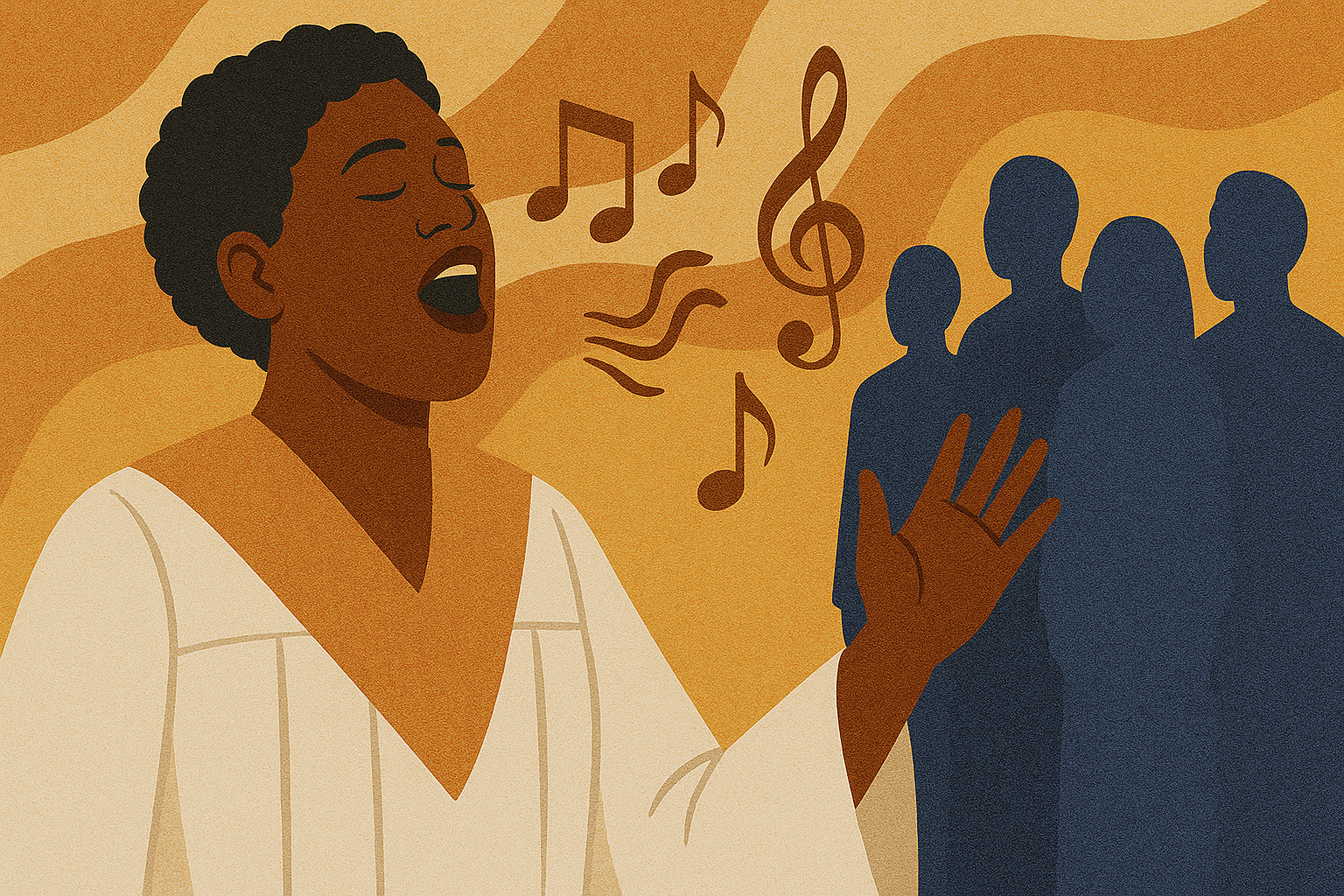The origins and evolution of gospel music are deeply tied to the African American experience, particularly through the legacy of slavery, the rise of the Black church, and ongoing struggles for freedom, dignity, and spiritual affirmation. Gospel music developed as both a sacred art form and a powerful tool for cultural survival and expression, evolving over centuries while influencing nearly every major American music genre.
Origins of Gospel Music
African Roots & Spiritual Resilience
- Enslaved Africans brought with them rich musical traditions: call-and-response, rhythmic complexity, group singing, and spiritual function of music.
- Despite being stripped of their languages and instruments, enslaved people developed new forms of sacred music in the Americas, often blending African musicality with Christian themes.
Spirituals (1700s–1800s)
- The earliest precursors to gospel were Negro spirituals: religious songs created and sung by enslaved people.
- Spirituals expressed faith, sorrow, coded messages of escape, and communal hope.
- Examples: “Swing Low, Sweet Chariot”, “Wade in the Water”, “Go Down, Moses”
- Examples: “Swing Low, Sweet Chariot”, “Wade in the Water”, “Go Down, Moses”
- These were oral traditions, passed down through generations and often improvised.
Post-Emancipation & the Rise of the Black Church (late 1800s)
- After slavery, independent Black churches flourished, particularly Baptist and Methodist denominations.
- Church music began to combine spirituals with European hymns, creating a unique worship style: passionate, improvisational, and participatory.
- Leaders like Rev. Charles Tindley composed early gospel hymns that emphasized hope and endurance.
Development and Golden Age (1920s–1950s)
The Birth of Modern Gospel
- Gospel as a distinct genre took shape in the early 20th century, largely through the work of Thomas A. Dorsey (“the father of gospel music”).
- He fused blues with sacred lyrics, creating a new, emotional and rhythmic gospel sound.
- His songs like “Take My Hand, Precious Lord” became standards.
- He fused blues with sacred lyrics, creating a new, emotional and rhythmic gospel sound.
Quartets and Choirs
- Gospel quartets like the Golden Gate Quartet brought tight harmonies and showmanship.
- Gospel choirs, such as the Roberta Martin Singers and later James Cleveland’s choirs, emphasized rich harmonies, call-and-response, and powerful soloists.
Icons of the Golden Age
- Mahalia Jackson, often called the greatest gospel singer, brought gospel to national and international audiences.
- Her performances combined deep spirituality, vocal strength, and civil rights advocacy.
Civil Rights Era and Beyond (1950s–1970s)
Gospel as a Voice for Justice
- Gospel became a soundtrack for the Civil Rights Movement — sung at marches, rallies, and churches.
- Songs like “We Shall Overcome” and “Oh Freedom” embodied collective resolve.
- Songs like “We Shall Overcome” and “Oh Freedom” embodied collective resolve.
- Many gospel artists, including Mahalia Jackson, Sam Cooke, and Aretha Franklin, were active in or influenced by the movement.
Crossover and Secular Influence
- Artists like Sam Cooke, Ray Charles, and Aretha Franklin started in gospel and brought its vocal power and style into soul, R&B, and pop.
- Gospel’s influence shaped modern secular music, even as it remained rooted in church traditions.
Contemporary Gospel (1980s–Present)
Urban and Contemporary Gospel
- In the 1980s and 1990s, artists like Kirk Franklin, Yolanda Adams, and Fred Hammond modernized gospel by incorporating hip hop, funk, R&B, and pop.
- This broadened gospel’s appeal beyond church walls, especially among youth.
Global Gospel
- Gospel music has inspired artists worldwide — from Afro-gospel in Nigeria to gospel choirs in Korea, South Africa, and Sweden.
- The genre now encompasses traditional, contemporary, praise & worship, gospel rap, and even gospel EDM.
In Summary: The Evolution of Gospel Music
| Era | Key Features | Major Contributors |
| Slavery & Spirituals (1600s–1800s) | Oral tradition, coded messages, spiritual endurance | Enslaved African Americans |
| Post-Emancipation (Late 1800s) | Black hymns, church-driven worship | Rev. Charles Tindley |
| Early Gospel (1920s–1940s) | Fusion of blues and sacred music | Thomas A. Dorsey, Sallie Martin |
| Golden Age (1940s–1960s) | Choirs, quartets, national prominence | Mahalia Jackson, Clara Ward |
| Civil Rights Era (1950s–1970s) | Music as protest and inspiration | Aretha Franklin, Sam Cooke |
| Contemporary Gospel (1980s–Today) | R&B, hip hop fusion, global reach | Kirk Franklin, CeCe Winans |
